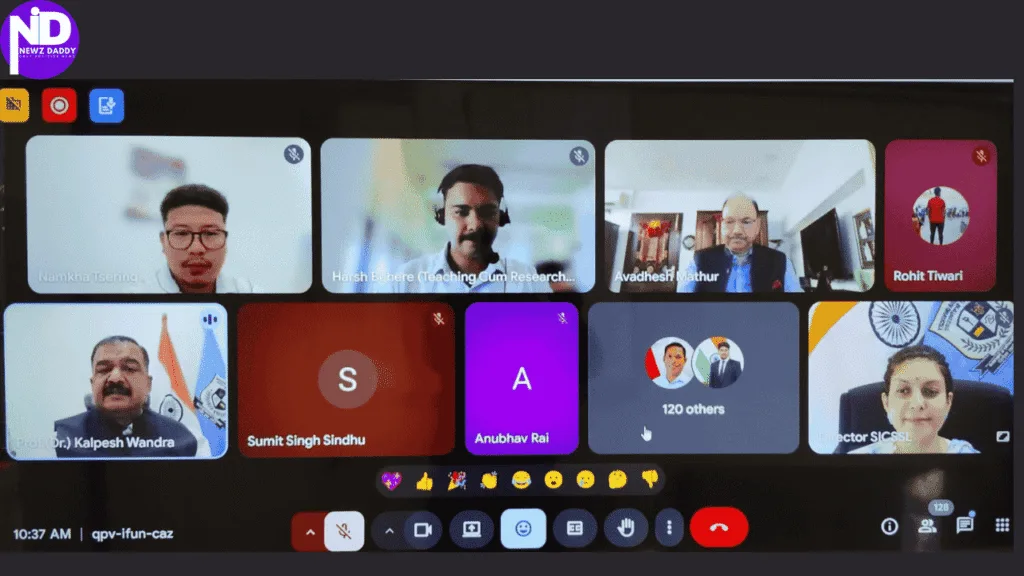Dynamics of Pakistan: Challenges, Paths, and Future Risks
Newz Daddy Educational Updates
The Centre for India’s Neighbourhood and Internal Security Studies (CINISS), under the aegis of the School of International Cooperation, Security and Strategic Languages (SICSSL), commenced its 6-day online certificate course on ‘Understanding Dynamics of Pakistan’ on 22nd September, 2025. The course aims to provide a comprehensive understanding of Pakistan’s political, economic, security, and ethnic dynamics and their implications for India and the region.
I looked up related info: SICSSL is part of Rashtriya Raksha University (RRU), which is a public central university focused on security, strategic and policing education, research and training. It is located in Gandhinagar, Gujarat.
The inaugural session began with a welcome address by Dr Aparna Varma (Director I/c SICSSL), followed by opening remarks by Prof. (Dr.) Kalpesh H. Wandra, Pro Vice-Chancellor, RRU. The address would emphasise the importance of scholarly engagement in understanding India’s neighbourhood and its strategic challenges.
Dr Aparna Varma leads SICSSL and is responsible for its domain of international cooperation, security, and strategic languages. Her role includes shaping programs that combine foreign languages with security studies. Rani Rammohun Roy University Prof. Kalpesh H. Wandra, as Pro Vice-Chancellor, helps in academic leadership at RRU, which has various schools, including SICSSL. The scholarly engagement helps not just academics but also practitioners in policy, military, and security forces. RRU emphasises real-world applications in its short courses as well as degrees.
The first session was on ‘Pakistan in Perspective: Country at Crossroads’ by Shri. A. B. Mathur, Member of the National Security Advisory Board (NSAB). This session highlighted Pakistan’s historical and contemporary trajectory, focusing on its geopolitical position, domestic challenges, and the evolving role of the military in governance.
NSAB is a board that advises the NSA / government on long-term security issues. Recently, the NSAB was revamped with Alok Joshi as chair. The idea of “country at crossroads” reflects Pakistan’s tensions among civil institutions, military influence, instability, and sometimes political transitions under military or semi-military rule. Also, Pakistan’s foreign policy choices, relationships with China, Afghanistan, the US, and regional neighbours affect its crossroads status.
This was followed by the second session on ‘Pakistan’s Economy: Future Challenges and Opportunities’ by Capt. Alok Bansal (Retd.), Executive Vice President, India Foundation. He provided an in-depth analysis of Pakistan’s economic situation, exploring structural challenges, dependency on international aid, and the potential impact of projects like the China-Pakistan Economic Corridor (CPEC).
India Foundation is a think tank based in New Delhi that works on foreign & public policy, security & strategy, etc. Capt. Alok Bansal is a former naval officer and now heads India Foundation; his expertise includes Pakistan’s internal dynamics, the economy and the strategic projects like CPEC. Pakistan faces recurring problems: inflation, debt, foreign exchange shortages, dependency on the IMF or other multilateral aid, issues of fiscal imbalance, energy crisis, etc. The CPEC brings both opportunity (infrastructure, connectivity) and risk (debt, strategic dependency, environmental/social disruptions).
Participants from diverse backgrounds attended these sessions, including army officers, air force officers, officers from state police, international participants, researchers, policy practitioners, academicians, and students of international relations and security studies. These sessions provided invaluable insights into the multifaceted nature of Pakistan’s internal and external dynamics.
Such diversity helps because different sectors see issues differently: the military sees security; economists see economy; police see law & order; researchers see trends; and foreign policy experts see external relations. Also, regional perspectives matter: Pakistan’s relations with India, Afghanistan, Iran, and China. Ethnic dynamics: provinces like Balochistan, Sindh, Pashtun areas, and the Kashmir belt. Also, demographic pressures, youth unemployment, access to education, etc.
The next six days will cover themes on Pakistani politics, security, economy, foreign policy, ethnicity and demographic profile. The speakers include Chairman NSAB, Shri. Alok Joshi, Shri. Tilak Devasher, Lt. Gen. A.K. Singh PVSM, AVSM, YSM, SM, VSM, Shri Rajiv Sinha, Dr. Ashok Behuria, Dr. Tara Kartha, Amb. TCA Raghvan, Lt. Gen. S. L. Narsimhan PVSM, AVSM*, VSM.
These are senior experts: Alok Joshi as chair of NSAB; Tilak Devasher, a former bureaucrat, has experience in security and policy; Lt Gen A. K. Singh, a senior military leader; Amb. TCA Raghvan is a diplomat; others like Dr Ashok Behuria and Dr Tara Kartha are scholars. They will bring multiple lenses. Ethnicity & demographics are vital: Pakistan has a mix of languages, religious minorities, migrations, refugee populations, and birth rates. Security includes cross-border terrorism, nuclear dynamics, and internal insurgencies. Foreign policy includes Pakistan’s relations with China, the US, and the Middle East.

